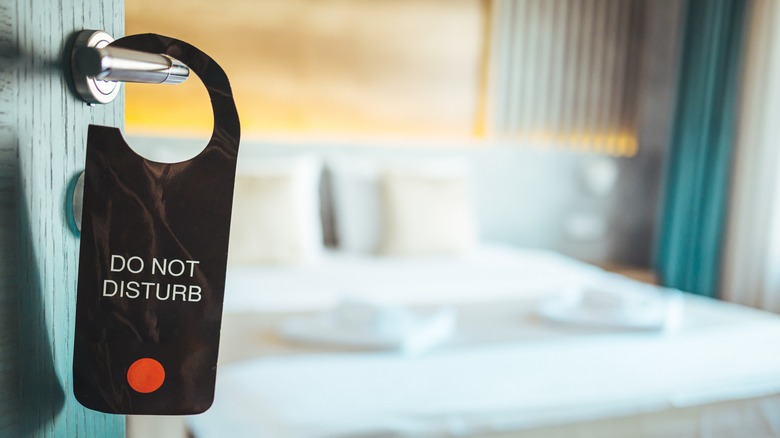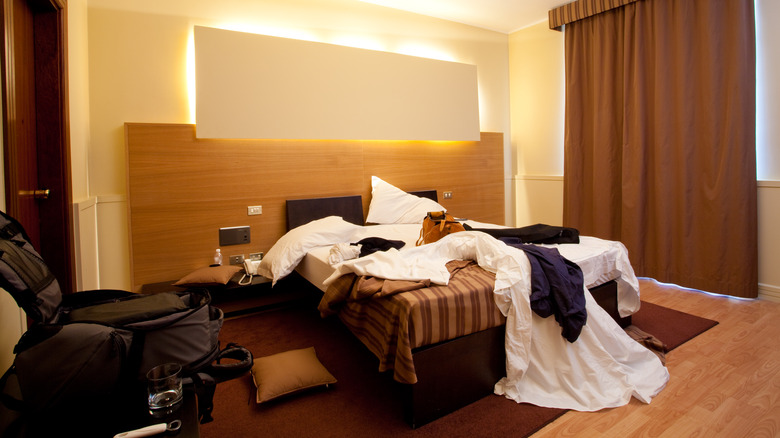Hotel Housekeepers Want You To Understand One Thing About Using The 'Do Not Disturb' Sign
After you've been sitting elbow-to-elbow on a packed plane or pushing through the crowds at popular tourist spots, space and privacy in your hotel room can be a huge source of relief. To make sure no one disrupts your wind-down time, you put the "do not disturb" sign on your door, leaving it there without thinking twice.
Most hotels have some version of the sign available for guests to use, whether it's a placard that hangs from the handle or a switch that triggers a light to come on, communicating to staff when it's okay to enter. The "do not disturb" message is most useful during the day when hotel housekeepers ritually come by to tidy and freshen up the rooms. If you don't need new towels and haven't cluttered your suite with food and other litter, a visit from the cleaning staff may seem unnecessary.
You might even assume that leaving up the "do not disturb" sign will lighten the workload for busy housekeepers. However, the truth is that using the designated sign to skip room refreshes might actually make housekeepers' jobs even harder.
Fewer cleanings lead to dirtier rooms
Using the "do not disturb" sign — especially for a full day or even an entire trip — is a bad idea, according to some hotel staff members. As one housekeeper from W Hotel shared with HuffPost, "I would never leave the 'do not disturb' sign up for my whole stay. Maybe the guests think that when we don't clean the room, it's easier for us, but when a room has two or three days without cleaning, it's very dirty." The housekeeper revealed that this forces them to rush through their cleaning duties, increasing their risk of getting hurt. Moreover, a lack of demand for housekeeping services can put them out of work.
A longtime guest room attendant in Las Vegas echoed similar concerns to The New York Times: "There is soap scum buildup in the bathroom, lots of trash in the room, and it takes a lot longer to clean and vacuum the rooms," she said, adding, "It gives me a lot of stress because I get behind on my work."
Even still, some hotels encourage the use of "do not disturb" signs as part of an eco-friendly campaign. The idea is that less frequent cleanings, including fewer bedding changes and towel replacements, could save water and electricity. However, these campaigns, too, can be a burden for cleaning staff, as Annemarie Strassel, director of communications for UniteHere (a union of hotel workers), told USA Today.
Security is also a concern
If you tend to rely on the "do not disturb" sign at hotels, know that you might be inadvertently raising a red flag to employees. According to USA Today, some hotel chains changed their policies on the signs after a gunman in a 2017 Las Vegas mass shooting reportedly used his hotel room to help carry out the attack. Following the tragic incident, Hilton considered a new practice where security or duty managers would be notified if a "do not disturb sign" was left on a hotel room door for more than 24 hours. Similarly, Wynn Resorts decided to take action when the signs are used for 12 or more hours at a time.
If you use the "do not disturb" placard for more than a few hours, don't be surprised if a member of the hotel staff calls your room or slips a note under your door to make sure you're okay. If they grow suspicious, they may even enter your room without permission in accordance with the hotel's "do not disturb" policy. If privacy is a top priority when traveling, ask about this policy when checking into a hotel to avoid a surprise visit from a housekeeper.


